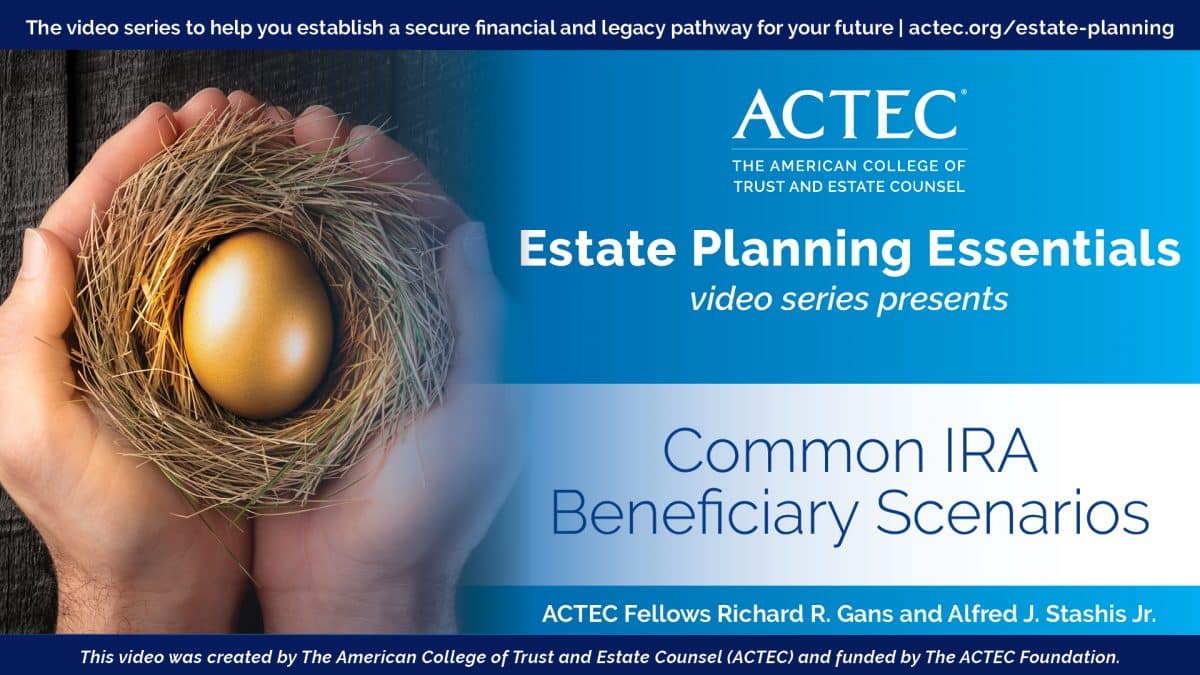Understand the fundamentals of IRAs and naming IRA beneficiaries such as how to name a spouse, children, a trust, unborn children or charities as beneficiaries in this short video.
IRA beneficiary designations can be confusing. Learn the essentials of naming IRA beneficiaries from trust and estate experts and ACTEC Fellows Stacy E. Singer and Svetlana V. Bekman.
Transcript
Hi, I’m Stacy Singer, an ACTEC Fellow, and I’m here with Svetlana Bekman, an ACTEC Fellow from Chicago. We’re going to talk about IRAs and IRA Beneficiaries. Svetlana, welcome.
Can you start by telling us how does an IRA distribute at my death?
Svetlana Bekman: IRA ownership passes either through a beneficiary designation or, if there is no beneficiary designation, pursuant to default provisions contained in the document governing the IRA. So for example, if you don’t complete your beneficiary designation form the document might provide that your spouse will inherit, otherwise your children, otherwise your estate. Now it doesn’t matter if you attempt to transmit the IRA through your will or trust. In every case, the beneficiary designation will control the disposition.
Stacy Singer: So, can I name my spouse as my beneficiary of the IRA?
Svetlana Bekman: Certainly. In fact, the spouse has maximum flexibility under the income tax rules when they inherit the IRA. The most popular option is to rollover the IRA and then name the spouse’s own beneficiaries. And going forward, the spouse will be treated for income tax purposes as though they were the original owner of the IRA.
Stacy Singer: So, as an alternative to my spouse, could I name a trust as the IRA beneficiary?
Svetlana Bekman: You can certainly name the trust. You do want to keep in mind that unless the trust satisfies certain particular income tax rules, the rate of distribution of the IRA and also the rate at which the proceeds are subject to income tax may be higher than if individuals were named directly. And I would say that the IRA owner should really be prepared for a trade-off between the benefits of a trust, which includes professional asset management as well as creditor protection of the beneficiaries and income tax stretch. And by income tax stretch, I mean the ability to distribute IRAs over the life expectancy of an individual.
Stacy Singer: So, can I name my kids as a beneficiary directly?
Svetlana Bekman: You can name the kids as beneficiaries directly, certainly. You want to keep in mind that they will be able to withdraw the assets immediately and in full if named as beneficiaries, and so if the amount is large enough and the kids are perhaps too young, you might want to think about whether they have the maturity to handle the financial responsibility. Also, you might consider a generic beneficiary designation if that’s acceptable to the custodian, such as “to my then living children in equal shares,” or “to my then living descendants per stirpes,” and that type of designation should work even if the deaths occur out of the natural order where the child predeceases the parent. And finally, if the children divide the IRA into separate inherited IRAs in a timely fashion, then each of them will be able to use their separate life expectancy for purposes of distribution.
Stacy Singer: What about charity? Can I name a charity as the beneficiary of the IRA?
Svetlana Bekman: A charity might be a particularly good choice as an IRA beneficiary. An IRA has embedded income tax liability while the charity is tax-exempt, so that’s potentially a very good match. An IRA owner who has both IRAs and non-IRA assets and is thinking about whether to leave the IRA to a charity or non-charitable beneficiaries, such as spouse or children, probably should go with charity, but I would still recommend that an advisor crunch the numbers.
Stacy Singer: Great, and then one last question, can I name my estate to be the beneficiary of my IRA?
Svetlana Bekman: Certainly, from a property law perspective, an estate can be named as beneficiary, but keep in mind that an estate does not have a life expectancy so the stretch that would be available is limited to the larger of, or the longer of, five years and the remaining life expectancy of the IRA owner. And in addition, any IRA assets payable to the estate will be exposed to the creditors of the IRA owner. However, if neither income tax nor creditor issues are a concern, then an estate can certainly be named as a beneficiary.
Stacy Singer: Well, Svetlana, thank you so much. This has really been incredibly informative, and thanks so much for watching.
Featured Video
Common IRA Beneficiary Scenarios
There are no do-overs with IRA beneficiaries! Understand the typical IRA beneficiary scenarios and why reviewing every time you set up an IRA is critical.
ACTEC Estate Planning Essentials

ACTEC Fellows provide answers to frequently asked trust and estate planning questions in this video series.



